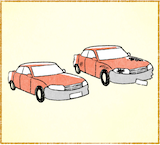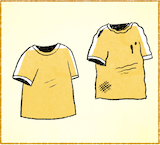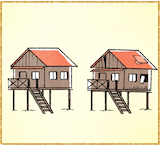


อันนี้คืออี่หยัง อันนี้เป็นลด เขาเอิ้นว่าลดเก็ง
ลดเก็งมีจักคัน ลดเก็งกะมีสองคัน มีคันที่หนึ่งกับคันที่สอง
คันที่หนึ่งเป็นแบบใด คันที่หนึ่งกะอยู่ฝั่งซ้าย ซ้ายมือที่เฮาเห็นเนาะ มีลักสะนะใหม่ๆ เป็นลดใหม่ๆ บ่มีฮอยอี่หยังเลย อาดสิเป็นลดส้างมาใหม่ หลือว่าผะหลิดมาใหม่ เฮ็ดมาใหม่เนาะ กะใหม่เอี่ยม บ่มีฮอดหม้องอี่หยังหม้องพังหม้องหญังเลย
แล้วลดคันที่สองหละ เป็นลดคันบ่ใหม่ดอก ลดคันเก่า อาดสิซื้อมาแต่โดนแล้ว หลือว่าขี่มาแต่โดนแล้ว ผะหลิดมาแต่โดน เฮ็ดมาแต่โดนแล้ว
7
อันนี้คืออี่หยัง อันนี้กะเป็นเสี้ย เสี้ยยื้ดเนาะ เป็นเสี้ยยื้ด ไว้ถ้าใส่หนิหละ เสี้ยแขนสั้น
โตใหญ่บ่ กะจักคือกัน แล้วแต่ บ่ลู้ว่าไซอี่หยัง
เป็นโตสีเหลียง มีสองโต โตหนึ่งกะใหม่ๆ ดอก บ่มีฮอดฮอยอี่หยังเอาโลด บ่มีฮอยใส่ อาดสิเป็นเสี้ยโตใหม่ เสี้ยบ่ทันได้มีคนใส่จักเที่ย
แต่ว่าอีกเสี้ยอีกโตหนึ่งกะคือสิเก่าแล้ว คือสิมีคนใส่ดุแล้ว หลือว่าใซ้งาน ผ่านกานใซ้งาน คนใส่มาดุแล้ว กะเลยเก่า เบิ่งไปแล้วดำปี้ๆ อยู่ บ่มีฮอยใหม่อี่หยังเลย มีแต่ฮอยเก่า มีแต่ฮอยเปี้ยนฮอยหญังเนาะ
8
อันนี้คืออี่หยัง อันนี้กะเป็นบ้านเนาะ เป็นบ้านไม้ สองซั้นพุ้นแหล้ว
มีสองหลัง เปียบเทียบกัน หลังหนึ่งกะใหม่ๆ ดอก อาดสิส้างขึ้นมาใหม่เนาะ บ้านหลังนี้อาดสิส้างขึ้นมาใหม่
อีกหลังหนึ่งกะเก่าๆ อาดว่าส้างมาแต่โดนแล้ว เฮ็ดแต่โดนแล้ว อยู่ในบ้านหลังนี้โดนเติบ หลายปีหลายเอ่ยแล้วเนาะ กะสิเฮ็ดให้บ้านเก่าขั้นใซ้งานโดนเติบ หลือว่าผ่านอี่หยังมาหลาย มันกะสิเก่า มันกะสิเก่าสิฮ้างสิเพไปเลี้ยยๆ เนาะ
Link to overview page
Link to dictionary
| Isaan | Pronunciation | Tones | Thai | English/Notes |
|---|---|---|---|---|
| อัน | an | M | อัน | 1. thing, object 2. general clf. for objects |
| นี้ | ni: | HF | นี้ | 1. this 2. here |
| คือ | khʉ: | HR | คือ | 1. to be, to resemble, like, as 2. why {บักหล้าคือบ่เก็บโต่ะแน่ = [addressing a young boy] Why haven't you cleared the table?} |
| อี่หยัง | i:-yaŋ | H-M | อะไร | 1. what {นี้คืออี่หยัง = What is this?} {มื้อนี้เจ้าเฮ็ดอี่หยัง = What are you doing today?} {กินเข้างายกับอี่หยัง = What did you have for breakfast?} 2. something, anything, (in negations) nothing {บ่ต้องเฮ็ดอี่หยังอีกเลยนอกจากใส่ปุย = [we] don't need to do anything besides adding fertilizer} |
| เป็น | pen | M | เป็น | 1. to be, to exist 2. to be able to 3. to suffer, sth. happens to 4. เป็นหญัง[...]คือ in initial position: why? {เป็นหญังเขากะคือแปงฟัน = Why is he brushing his teeth?} {เป็นหญังเคี่ยงบินมันคือสิตก = Why is the airplane falling down?} |
| ลด | lot | H | รถ | 1. car, motorized vehicle 2. vehicle, cart {ลดขายแนวกิน = food cart} |
| เขา | khao | M | เขา | personal pronoun: he, she |
| เอิ้น | ə:n | HF | พูด, เรียก | to call, to say {เอิ้นง่ายๆ ว่า = in other words} {คนอี่สานเอิ้นว่า เป็นลูกคนกก = Isaan people call her ลูกคนกก} |
| ว่า | wa: | H | ว่า | 1. that, as {คำว่า X = the word X} 2. to say |
| ลดเก็ง | lot-geŋ | H-M | รถเก๋ง | car (sedan) |
| มี | mi: | HR | มี | 1. to have 2. there is |
| จัก | jak | M | จัก | 1. answer to a question: [I] don't know, don't know exactly, [I'm] not sure {พุซายคนนี้เขาเถ้าไป่ จัก จักเถ้าหลือบ่เถ้า เบิ่งบ่ค่อยออก = Is this man here already old? I don't know. I can't see clearly whether he's old or not.} {เขาเว้ากันอยู่ใส จักคือกัน = Where are they talking? I don't know either.} 2. exact(ly), what exactly {จักต้มอี่หยังกะบ่ฮู้ = I don't know what (exactly) he is cooking} {บ่ลู้คือกันจักปาอี่หยัง = I don't know either what kind of fish this is} 3. how much/many? {ต้นไม้มีจักต้น = How many trees are there?} {ตอนนี้จักโมงแล้ว = What time is it now?} {มือของเฮานี้สิมีจักนิ้ว = How many fingers do our hands have?} 4. a bit, a little bit {จักหน่อย/จักหน่อยหนึ่ง = a bit, a little bit} |
| คัน | khan | HR | คัน | clf. for cars, trains, motorbikes, boats {ลดไฟคันนี้ = this train} {ลดเก็งคันสีเขียวคันน้อย = a small green car} |
| กะ | ga | M | ก็ | 1. then, consequently 2. also |
| สอง | sɔ:ŋ | M | สอง | two |
| ที่ | thi: | H | ที่ | 1. that, which {คนที่ยืนอยู่ฝั่งขวา = the person which is standing on the right = the person standing on the right} {เว้าคำที่บ่สุพาบ = to speak words which are impolite = to speak impolitely} 2. for ordinal numbers {ที่สาม = third} |
| หนึ่ง | nʉŋ | H | หนึ่ง | 1. one 2. after adjective: intensifier {บักคักหนึ่ง = very much} {อันบักใหญ่หนึ่ง = very large}, or attenuates the meaning {กะดาดมันแผ่นน้อยๆ หนึ่ง = the piece of paper is [relatively] small} |
| กับ | gap | M | กับ | 1. and {ลุงกับป้า = uncle and aunt} {กวยเตียวหมูกับกวยเตียวไก่ = noodle soup with pork and noodle soup with chicken} 2. with, to {ค้ายๆ กับคำว่า ... = similar to the word ...} 3. prefix in front of foods {กับเข้า = side dishes eaten with rice} {เขากินกับกวยเตียว = he's eating noodle soup} |
| แบบ | bɛ:p | LF | แบบ | 1. example, model, kind 2. style, form, pattern, design |
| ใด | dai | M | ใด | 1. which, that one which, what, how {เขานั่งแบบใด เขานั่งขดตะหมาดอยู่ = How is he sitting? He's sitting cross-legged.} {ตอนใด = when?} 2. whichever, whoever {หม้องใดหม้องหนึ่ง = some place, somewhere} {ขั้นเฮาอยากตื่นญามใด เฮากะตั้งเวลาปุกญามนั้น = If we want to get up at a certain time, we set the alarm to that time} Notes: sentence-final often with a marked rising tone |
| อยู่ | yu: | H | อยู่ | 1. to be (located) at 2. yet, still 3. auxiliary indicating continuous or progressive action {ทอดปาอยู่ในกะทะ = (in the process of) frying a fish in the pan} {แม่กำลังเมี้ยนเฮียนอยู่ = mother is cleaning/tidying up the house} |
| ฝั่ง | faŋ | H | ฝั่ง | 1. side 2. river/canal bank, shore |
| ซ้าย | sa:i | HF | ซ้าย | left |
| มือ | mʉ: | HR | มือ | 1. hand 2. front leg/paw (e.g., of a cat) |
| เฮา | hao | HR | เรา | 1. personal pronoun: we 2. personal pronoun: I |
| เห็น | hen | M | เห็น | to see |
| เนาะ | nɔ | H | เนาะ | final particle: makes the statement softer, looking for agreement |
| ลักสะนะ | lak-sa-na | H-M-H | ลักษณะ | feature, characteristic, quality |
| ใหม่ | mai | H | ใหม่ | new |
| บ่ | bɔ: | H | ไม่ | 1. no, not 2. question particle, transforming a statement into a question Notes: spelling exception in line with common usage on social media |
| ฮอย | hɔ:i | HR | รอย | mark, trace |
| เลย | lə:i | HR | เลย | 1. futher on, beyond, past {เข็มน้อยเลยเลขสิบสองไป = the minute hand has passed number twelve} 2. too much 3. at all 4. definitively 5. completely, utterly |
| อาด | a:t | LF | อาจ | 1. might, may, will 2. likely |
| สิ | si | M | จะ | future tense auxiliary {เขากำลังสิตื่น = he's about to wake up} {สิไปตะหลาด = [I'm] going to the market} |
| ส้าง | sa:ŋ | LF | สร้าง | to build {ส้างบ้านส้างเฮียน = to build a house} |
| มา | ma: | HR | มา | 1. to come 2. auxiliary expressing action towards the present or focal time {กะคุเฮ็ดมาจากอี่หยัง = What is the bucket made of?} {แล้วเขากะเก็บเงินจากพุนั้นมา = and then she takes the money of that person} |
| หลือ | lʉ: | M | หรือ | or |
| ผะหลิด | pha-lit | M-M | ผลิต | to produce, manufacture, make |
| เฮ็ด | het | H | ทำ | to do, to make |
| เอี่ยม | i:am | H | เอี่ยม | new, brand-new, fresh |
| ฮอด | hɔ:t | HF | ถึง | 1. to arrive, to attain {ฮอดจุดหมายปายทาง = (airplane, train etc.) to arrive at one's destination} {มันทันได้ฮอดหกโมงอยู่ = it's not yet 6 o'clock} 2. to, at {ผมญาวฮอดบ่าไหล่เอาโลด = long hair down to the shoulders} 3. about {บ่ได้เว้าฮอด = [I] haven't talked about [this]} {คนที่เฮาเว้าฮอดวั่งหั้นหละ = the person we've just talked about} |
| หม้อง | mɔŋ | LF | ที่, แห่ง, บริเวณ | 1. place, area {หลายที่หลายหม้อง = in many places} {หม้องใดหม้องหนึ่ง = some place} 2. clf. for places |
| พัง | phaŋ | HR | พัง | 1. to be destroyed 2. to be damaged, broken |
| หญัง | ɲaŋ | M | อะไร, เป็นหญัง = ทำไม | 1. what {เขากำลังเฮ็ดหญัง = What is he doing?} {ธูปเอาไว้เฮ็ดหญัง = What are incense sticks for?} 2. something, anything, (nothing) 3. เป็นหญัง[...]คือ in initial position: why {เป็นหญังเขาคือใส่บักพิกลงไปในกวยเตียว = Why is he putting chili in [his] noodle soup?} {เป็นหญังหน้าต่างมันคือเปิด = Why is the window open?} {เป็นหญังมันคือมีควนไฟ = Why is there smoke?} |
| แล้ว | lɛ:o | HF | แล้ว | 1. finished 2. already 3. and then, and next (especially แล้วกะ) 4. auxiliary for past tense |
| หละ | la | M | แหละ, ล่ะ | 1. auxiliary for emphasis at the end of a phrase 2. auxiliary to create a follow-up question: And what about ... ? {แล้วลดคันที่สองหละ = And what about the second car?} |
| ดอก | dɔ:k | LF | หรอก, ดอก | 1. particle used after a negative, relativizing or explanatory statement to make the sense milder {กินเข้าบ่ บ่กินดอก = Are you going to eat [with us]? No.} {เป็นก้อนสี่เหลี่ยม ก้อนน้อยๆ ดอก = These are cubes, small cubes.} {แล้วกะมีลดคันหนึ่งขี่ผ่านมา เป็นลดเก็งดอก = And there's a car passing, a sedan.} 2. particle used to emphasize (not necessarily a negative) contrast 3. particle used for emphasis {ดอกไม้นี้งามบ่ กะงามอยู่ เบิ่งงามๆ ดอก = Is this flower beautiful? Yes, it's beautiful, it looks beautiful} |
| เก่า | gao | H | เก่า | old |
| ซื้อ | sʉ: | HF | ซื้อ | to buy |
| แต่ | tɛ: | H | จาก | 1. from {มาแต่โลงเลียน = [I'm] coming from the school} {เห็นเขาญ่างมาแต่ทางหลัง = seeing him coming from behind, see also: แต่ใส} 2. since, ago {แต่โดนเติบ = long ago} |
| โดน | do:n | M | นาน | time: long |
| ขี่ | khi: | H | ขี่ | to ride, to drive {ขี่มอเตอไซ = to ride a motorbike} {ขี่ควย = to ride on a buffalo} {ขี่เลีย = to take or travel on a boat} |
| เสี้ย | si:a | LF | เสื้อ | shirt |
| เสี้ยยื้ด | si:a-yʉ:t | LF-HF | เสื้อยืด | T-shirt |
| ไว้ถ้า | wai-tha: | HF-LF | usually in a positive statement or answer: is for, is used for, has the purpose of {กะทะมีไว้ถ้าทอด = a pan is for frying} {น้ำบักนาวมีไว้ถ้าปุงอาหาน = lime juice is used to season food} {ปากกามีไว้ถ้าเขียน = a pen is for writing} {กะเทียมเอาไว้ถ้าเฮ็ดแนวกิน = garlic is used to make food} {ขาเอาไว้ถ้าญ่าง = legs are for walking} {เกิบเอาไว้ถ้าใส่ = shoes are for wearing} Notes: see also ไว้ |
|
| ใส่ | sai | H | ใส่ | 1. to put something in/on {เขาใส่บักพิกในกวยเตียวหลาย = he's putting a lot of chili in his noodle soup} {เขาบีบยาสีฟันใส่แปงสีฟัน = he squeezes toothpaste on the toothbrush} {ก่องเอาไว้ใส่ของ = boxes are there to put stuff in} 2. to wear (clothes) {เขาใส่เสี้ยแขนญาว = he's wearing a long-sleeve} 3. directed at {เอิ้นใส่กัน = to call each other/to say to each other} {หมามันเห่าใส่แมว = the dog barks at the cat} {ล้องเพงใส่ไม = to sing into the microphone} {เขากำลังซี้มือไปใส่พุซาย = she's pointing at the man} |
| หนิหละ | ni-la | M-M | นี่แหละ | auxiliary for emphasis at the end of a phrase Notes: variant of นี้หละ |
| แขน | khɛ:n | M | แขน | arm |
| สั้น | san | LF | สั้น | short |
| โต | to: | M | ตัว | 1. body, self 2. clf. for animals, characters/letters/consonants, appliances, clothes (e.g., pairs of trousers, shirts) |
| ใหญ่ | ɲai | H | ใหญ่ | large, big |
| คือกัน | khʉ:-gan | HR-M | เหมือนกัน | 1. also, likewise, similarly {ยินดีที่ได้ฮู้จักคือกันคับ = Nice to meet you too!} 2. in negative sentences: either {บ่ลู้คือกัน = I don't know either} {จักคือกัน = I don't know (either)} |
| แล้วแต่ | lɛ:o-tɛ: | HF-H | แล้วแต่ | up to, depending on |
| ลู้ | lu: | HF | รู้ | 1. to know 2. to understand Notes: equivalent to ฮู้ |
| ไซ | sai | HR | ไซส์ | size |
| สี | si: | M | สี | 1. color 2. colored pencil, crayon |
| เหลียง | li:aŋ | M | เหลือง | yellow |
| เอาโลด | ao-lo:t | M-HF | เอาเลย, ทำเลย, จริงๆ | in final position: intensifier {โตส่ำกะทะเอาโลด = [a fish] as large as the pan!} {เกียบเต็มถ้วยเอาโลด = the bowl is almost full!} {ทะนาคานมันสิไปตั้งไว้อยู่ซู่หม้องเอาโลด = banks are everywhere!} |
| บ่ทันได้ | bɔ:-than-dai | H-HR-HF | ยังไม่ได้ | not, not yet {บ่ทันได้กินเข้า = [I] haven't eaten yet} {อายุบ่ทันได้หลาย = not yet old} {เขาอาดสิบ่ทันได้เถ้ากะได้ = maybe he's not yet (that) old} Notes: see also ทันได้ which is apparently equivalent |
| คน | khon | HR | คน | person, people |
| เที่ย | thi:a | H | ครั้ง, เที่ยว | clf. for times, rounds {บางเที่ย = sometimes} |
| แต่ว่า | tɛ:-wa: | H-H | แต่ว่า | 1. but 2. only {ฮู้แต่ว่าเขายืนอยู่พุเดียว = I only know that he's standing there by himself} |
| อีก | i:k | LF | อีก | 1. more, again 2. other, another |
| ดุ | du | M | บ่อยครั้ง | often, frequently |
| ใซ้งาน | sai-ŋa:n | HF-HR | ใช้งาน | to use, to put to use |
| ผ่าน | pha:n | H | ผ่าน | to pass |
| กาน | ga:n | M | การ | prefix indicating the action of ... |
| เบิ่ง | bəŋ | H | ดู | 1. to look at, to see, to watch {เบิ่งโทละทัด = to watch TV} {เบิ่งหนัง = to watch a movie} 2. to guess {เบิ่งซงแล้ว ... = [I] guess / from what it looks like ...} |
| ไป | pai | M | ไป | 1. to go 2. auxiliary indicating action extending into the future |
| ดำ | dam | M | ดำ | 1. black 2. to transplant rice seedlings {ดำนา = to transplant rice seedlings} |
| ปี้ๆ | pi:-pi: | HF-HF | ดำมาก | color: very dark or dirty |
| แต่ | tɛ: | H | แต่ | 1. but {แต่บ่ต่างกันหลาย = but not very different} {แต่บ่ลู้ว่าเขาญ่างมาแต่ใส = but [I] don't know where he's coming from, see also: แต่ว่า} 2. only {ตอนนี้มีแต่ขี้ฝ้า = now there are only clouds} |
| เปี้ยน | pi:an | HF | เปื้อน | dirty, stained, soiled |
| บ้าน | ba:n | HF | บ้าน | 1. house, home 2. village (also used as a prefix before the name of a village) 3. home country, home region {บ้านเฮาเฮ็ดเข้าจั่งใด = How do we plant rice in Isaan/Thailand?} |
| ไม้ | mai | HF | ไม้ | wood, tree |
| ซั้น | san | HF | ชั้น | 1. floor, shelf, step of a staircase {ซั้นเก็บเสี้ยผ้า = clothes shelf} {ซั้นวางหนังสือ = book shelf} 2. level, grade, class {ซั้นมอสี่ = secondary school grade four} 3. layer |
| พุ้นแหล้ว | phun-lɛ:o | HF-LF | นู่นแหละ | auxiliary for emphasis at the end of a phrase Notes: variant of พุ้นหละ |
| หลัง | laŋ | M | หลัง | 1. back, after 2. back (of body) {ขี่หลังควย = to ride on a water buffalo} 3. clf. for houses {บ้านหลังใหญ่ = a large house} {เฮียนไม้หลังเก่า = an old wooden house} |
| เปียบเทียบ | pi:ap-thi:ap | LF-HF | เปรียบเทียบ | to compare |
| กัน | gan | M | กัน | mutual, each other, with another, together {เขากำลังนั่งเว้ากัน = they're sitting and talking} {เขาสองคนฮักกัน = they love each other} {ปาสองโตนี้ ใหญ่ห่างกันหลายบ่ = These two fish here, are they very different in size (from each other)?} {ต่างกัน = to be different (from each other)} {ก่องอันไหนหนักกว่ากัน = Which box is heavier (than the other(s))?} |
| ขึ้น | khʉn | LF | ขึ้น | 1. to go up, to increase 2. sun: to rise {ตะเว็นกำลังขึ้น = the sun is rising} 3. more 4. bus/train etc.: to get on, to board {พุโดยสานขึ้นลดไฟเบิดแล้ว = all passengers have boarded the train} |
| ใน | nai | HR | ใน | in, within |
| เติบ | tə:p | LF | intensifier: very, much {เว้ากันโดนเติบ = to talk a long time} | |
| หลาย | la:i | M | เยอะ, มาก | many, much, very |
| ปี | pi: | M | ปี | year |
| เอ่ย | ə:i | H | generic term in reduplications, e.g., เด็กน้อยเด็กเอ่ย, เป็นแผเป็นเอ่ย, เฮ็ดตาเฮ็ดเอ่ย, มีหญ้ามีเอ่ย, เฮ็ดบ้านเฮ็ดเอ่ย | |
| ให้ | hai | LF | ให้ | 1. to give {หมอกำลังเอายาให้คนป่วยกิน = the doctor is giving the patient medicine} 2. for 3. to allow, to be allowed |
| ขั้น | khan | LF | เมื่อ | when, if |
| มัน | man | HR | มัน | it (also used to refer to people) |
| ฮ้าง | ha:ŋ | HF | พัง, เสีย | broken, damaged |
| เพ | phe: | HR | เพ, พังทลาย, พัง, เสีย | 1. to fall apart 2. to destroy, wreck, demolish 3. to suffer damage 4. broken, damaged, destroyed Notes: translation to be confirmed |
| เลี้ยยๆ | li:ai | HF | เรื่อยๆ | continuously Notes: pronunciation: also realized as เลื้อยๆ |